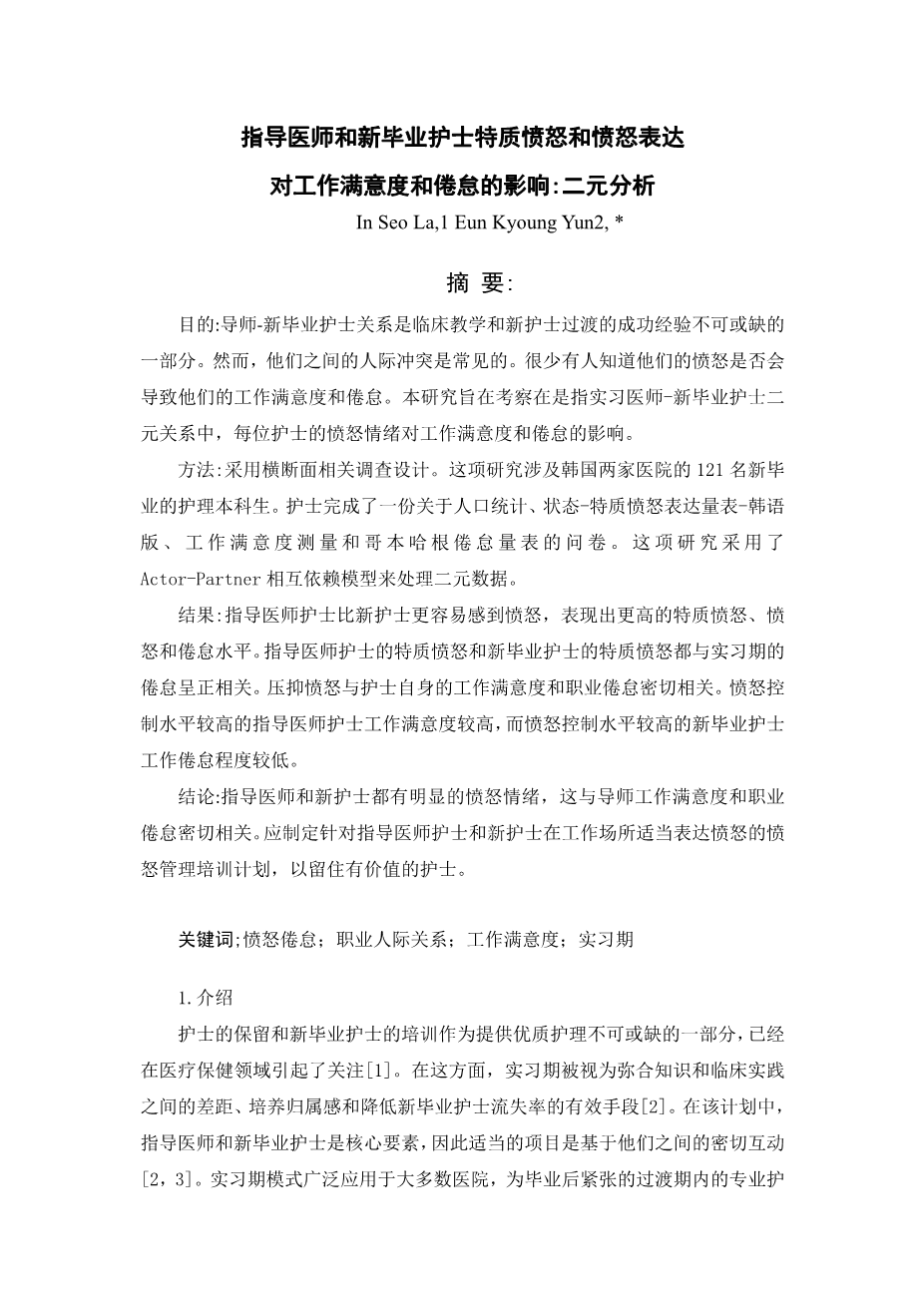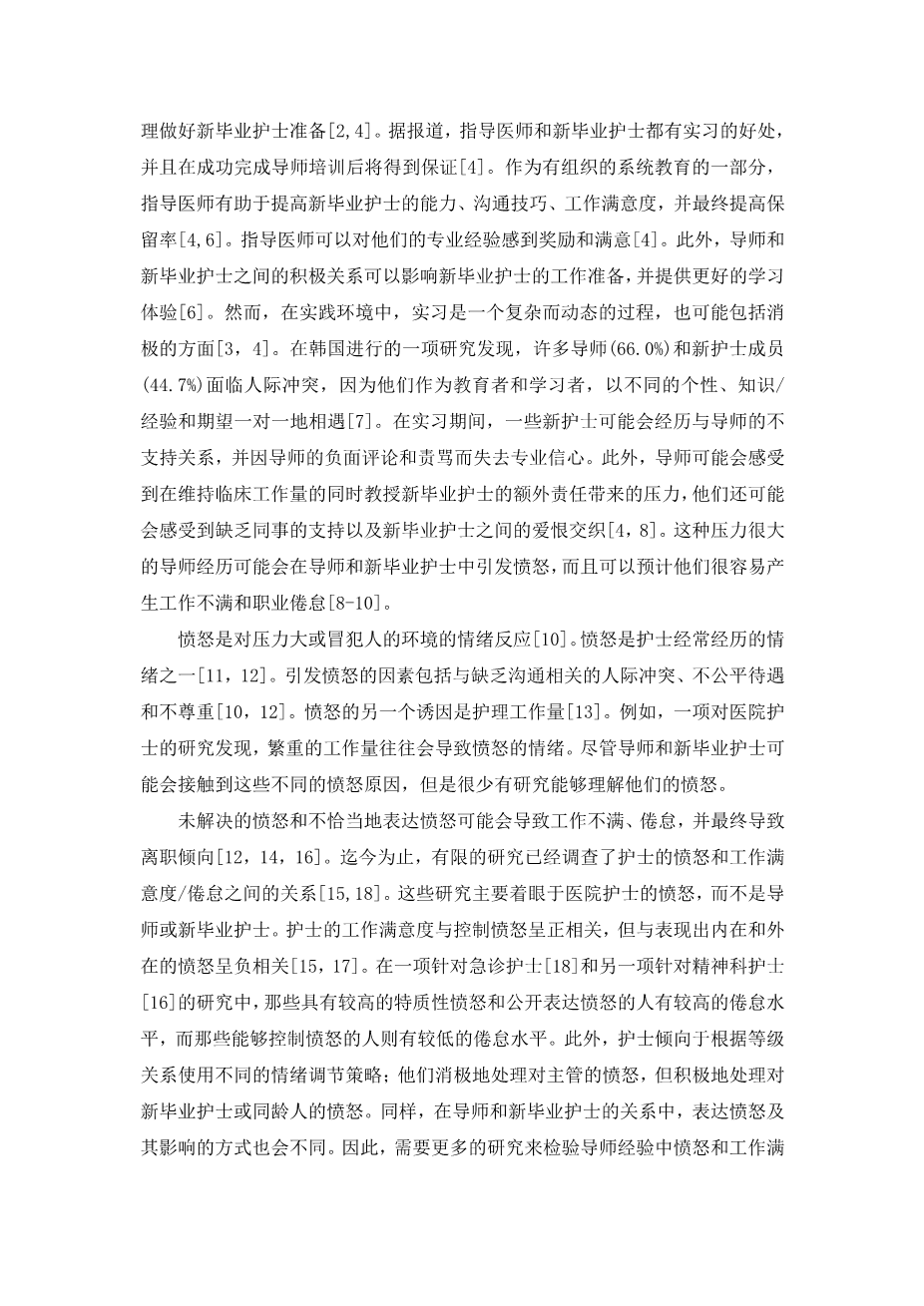Effects of Trait Anger and Anger Expression on Job Satisfaction and Burnout in Preceptor Nurses and Newly Graduated Nurses: A Dyadic Analysis
In Seo La,1 Eun Kyoung Yun2, *
School of Nursing, University of Maryland Baltimore, Baltimore, MD, USA
College of Nursing Science, Kyung Hee University, Seoul, Republic of Korea
Abstract
Purpose: The preceptor-newly graduated nurse (NGN) relationship is integral to the successful experience of clinical teaching and learning and new nurses transition. However, interpersonal conflicts between them are common. Little is known whether their anger contributes to their level of job satisfaction and burnout. This study aimed to examine the effects of each nurses anger on job satisfaction and burnout in preceptor_NGN dyads.
Methods: A cross-sectional, correlational survey design was used. This study involved 121 preceptor-newly graduate nurse dyads in two hospitals in South Korea. Nurses completed a questionnaire about demographics, the State-Trait Anger Expression Inventory-Korean version, a job satisfaction measure, and the Copenhagen Burnout Inventory. This study adopted the Actor-Partner Interdependence Model to handle dyadic data.
Results: Preceptor nurses reported higher frequencies of feeling anger than did new nurses and appear to have higher levels of trait anger, anger-out, and burnout. Both the preceptors and NGNs trait anger was positively associated with preceptors burnout. Suppressing anger was closely related to the nursesrsquo; own job satisfaction and burnout. Preceptors with a higher level of anger-control had higher job satisfaction, and NGNs with a higher level of anger-control had less burnout.
Conclusion: The results indicate that preceptors and new nurses appear to experience significant anger, which is closely associated with their job satisfaction and burnout during their preceptorship. Anger management training programs geared toward educating both preceptors and new nurses about appropriate anger expression in the workplace should be developed to retain valuable nurses.
Keywords Anger burnout; Professional interpersonal relations; Job satisfaction Preceptorship
1.Introduction
The retention of nurses and the training of newly graduated nurses (NGNs) have gained attention in the health-care setting as integral to providing quality care [1]. In this respect, preceptorship programs are viewed as an effective means of bridging gaps between knowledge and clinical practice, developing a sense of belonging, and lowering NGNsrsquo; turnover rates [2]. In preceptorship, preceptors and NGNs are the core elements, so appropriate programs are based on the close interaction between them [2,3]. The preceptorship model is widely applied to most hospitals to prepare NGNs for professional nursing during the stressful transition period after graduation [2e4]. Benefits of preceptorship for both new nurses and preceptors have been reported and would be guaranteed after successful completion of the preceptorship [4]. Preceptorship as part of an organized and systematic education helps to improve NGNs competence, communication skills, job satisfaction, and, eventually, retention rate [4,6]. Preceptors can feel rewarded and satisfied with their professional experience [4]. Moreover, a positive relationship between preceptors and NGNs can affect NGNsrsquo; work readiness and provide a better learning experience [6].However, preceptorship is a complex and dynamic process in the practice setting that can also include negative aspects [3,4]. A study conducted in South Korea found that many of preceptors (66.0%) and NGNs (44.7%) faced interpersonal conflicts since they met each other one-on-one as an educator and learner with different personalities, knowledge/experience, and expectations [7]. During preceptorship, some NGNs may experience unsupportive relationships with their preceptors and lose professional confidence because of preceptorsrsquo; negative comments and scolding [4]. In addition, preceptors may feel pressure from the additional responsibilities of teaching NGNs while maintaining their clinical workloads, and they may also experience a lack of support from colleagues and love-hate relationships with the NGNs [4,8]. Such stressful preceptorship experiences can foster anger among preceptors and NGNs, and it may be expected that they are vulnerable to job dissatisfaction and burnout [8-10].
Anger is an emotional reaction to circumstances that are stressful or offensive to the person [10]. Anger is one of the emotions that nurses frequently experience [11,12]. Factors triggering anger include interpersonal conflicts associated with lack of communication, unfair treatment, and disrespect [10e12]. Another trigger of anger was nursing workload [13]. For example, a study of hospital nurses found that a heavy workload tended to lead to feelings of anger [13]. Even though preceptors and NGNs can be exposed to these various causes of anger, very few studies have been conducted to understand their anger.
Unresolved anger and expressing anger improperly may contribute to job dissatisfaction, burnout, and ultimately, turnover intention [12,14e16]. To date, limited studies have investigated the associations between anger and job satisfaction/burnout among nurses [15e18]. These studies have looked at anger among hospital nurses in general, not focusing on preceptors or NGNs. Nursesrsquo; job satisfaction was positively associated with controlling their anger but was negatively associated with exhibiting internalized and externalized anger [15,17]. In one study on emergency nurses [18] and another on psychiatric nurses [16], those who had higher trait anger and expressed anger overtly had higher levels of burnout, while those who could control anger had lower levels of burnout. In addition, nurses tend to use different emotion regulation strategies depending on hierarchical relati
剩余内容已隐藏,支付完成后下载完整资料


英语译文共 12 页,剩余内容已隐藏,支付完成后下载完整资料
资料编号:[418067],资料为PDF文档或Word文档,PDF文档可免费转换为Word
以上是毕业论文外文翻译,课题毕业论文、任务书、文献综述、开题报告、程序设计、图纸设计等资料可联系客服协助查找。


